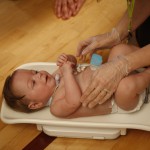Guest Post: When The Passing Gets Tough
 Rachael Halvorson, RD, LD, has been working as a registered dietitian at Pediatric Home Service since 2013. Rachael graduated with honors from Minnesota State University Mankato with a degree in Family Consumer Science (dietetics), and completed her dietetic internship with the Fairview Health Systems. Following the internship, Rachael obtained experience in long-term, acute, and homecare.
Rachael Halvorson, RD, LD, has been working as a registered dietitian at Pediatric Home Service since 2013. Rachael graduated with honors from Minnesota State University Mankato with a degree in Family Consumer Science (dietetics), and completed her dietetic internship with the Fairview Health Systems. Following the internship, Rachael obtained experience in long-term, acute, and homecare.
At PHS, Rachael specializes in the complex care of pediatric patients and works alongside infusion nurses & pharmacists, home care nurses, and respiratory staff to provide optimal nutrition for qualified PHS patients.
Here at Pediatric Home Service, we have four registered, licensed dietitians on staff to help answer your child’s nutrition questions. One question that I often receive from families I work with is in regards to combating constipation. I recently attended a presentation at the Nutrition for Infants, Children & Adolescents Intensive course in Birmingham, Alabama that shed more light on this tough subject!
Focusing on the Circular Effect
 Dr. Kirk A. Thame, MD presented on the treatment of common GI concerns. Dr. Thame is an Assistant Professor in the Division of Gastroenterology and Nutrition Sciences at University of Alabama/Children’s Hospital of Alabama. In Dr. Thames’s presentation, he stressed the circular effect of constipation in children. Children that experience constipation may associate having a bowel movement with pain and ultimately avoid going to the bathroom.
Dr. Kirk A. Thame, MD presented on the treatment of common GI concerns. Dr. Thame is an Assistant Professor in the Division of Gastroenterology and Nutrition Sciences at University of Alabama/Children’s Hospital of Alabama. In Dr. Thames’s presentation, he stressed the circular effect of constipation in children. Children that experience constipation may associate having a bowel movement with pain and ultimately avoid going to the bathroom.
When children hold their stool in, the colon continues to remove water making bowel movements even more difficult to pass. At this point, care givers often begin to treat with different interventions that may not address the root problem. Many bowel medications result with positive stool output that is soft and easy to pass, however, Dr. Thames warned that this is often newly formed stool, not the large mass of stool that has accumulated in the colon.
Re-Training Behaviors
Dr. Thames recommended initial treatment to begin the evacuation of the large ball of stool that has accumulated in the colon. The next step of treatment is to work on the behavior of holding the stool in. Finally, he recommended working on re-training the child to have regular bowel movements. He warned that for many of his patients, this re-training may take several months but the long term result would be beneficial.
Talk With Your Clinician
If you have questions about your child’s constipation, I encourage you to follow up with your pediatrician or gastroenterologist to develop a plan that will work!
As always, your registered dietitians remain available to help answer all of your nutrition questions. Call our main line at 615-642-1825 and ask to speak with a registered dietitian.
Originally published: May 13, 2014

